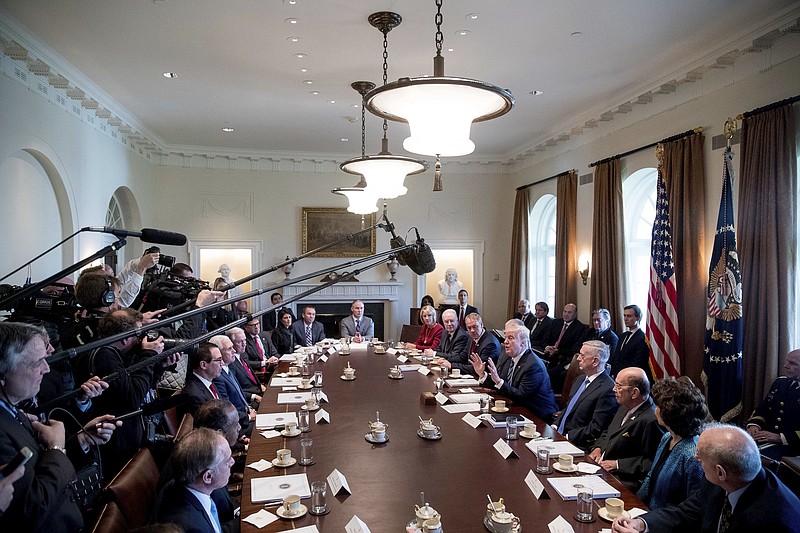The mandatory budget President Donald Trump released Thursday reflected many of the promises he made on the campaign trail in the last two years, but it'll be up to Congress - and perhaps his power of persuasion - as to whether he gets to keep those promises.
He told Americans he was tired of the country "losing" abroad, and his budget targets that belief by increasing military spending. He said he was tired of the U.S. sending so much assistance money to foreign countries, and his budget pares back those amounts.
Trump said it was sad the way veterans had been treated under the Obama administration, and his budget increases funds for those who have kept America safe. He said environmental regulations have strangled U.S. businesses, and his budget takes a big slice out of the Environmental Protection Agency.
The then-New York businessman promised he'd build a wall to keep illegal immigrants out of the country, and his budget includes money to begin that construction. He said students in struggling schools should have choices for a better education, and he has included money toward that end.
The president's $1.15 trillion budget covers only the ever- shrinking portion of the federal budget known as discretionary spending. It doesn't cover roughly $3 billion in entitlements such as Social Security and Medicare, which he has vowed not to touch.
Trump, with his first budget, has treated taxpayer money more like a thriving business must do, making cuts in some areas to make up for increases in others. Unfortunately, that will be lost on the low-information masses who believe the federal government has unlimited reserves to pay for anything and everything a lawmaker can propose to make their lives easier.
It becomes doubly hard when members of Congress in the party opposing the president, who know better, scream along with the masses about every cut. And they're joined by members of Congress of the president's party, who quickly forget both their conservative roots and the reason voters sent them to Washington when cuts touch a pet project.
Take the Corporation for Public Broadcasting, which received $445 million in fiscal 2016, for instance. Trump's budget eliminates it. In this day of hundreds of networks vying for viewers, it ought to have to stand on its own. After all, are there other places to see excellent children's programming? Are there other networks that show musical entertainment? Are there other broadcasting entities where you can watch quality drama? Yes, yes and yes. But what you'll read about is how parents have to tell their children the president is trying to kill Big Bird.
He's also zeroing out the National Endowment for the Arts, the National Endowment for the Humanities, the Overseas Private Investment Corp., the Woodrow Wilson International Center for Scholars, the African Development Foundation, the Appalachian Regional Commission and the United States Institute of Peace, among others.
Are the arts and the humanities important? You bet. Will the arts and humanities continue without government support? You bet.
Will people invest overseas, be international scholars, support community groups and enterprises in Africa, show concern for the Appalachian poor and seek peace without federal support? They certainly will, and in many cases other federal government agencies and programs fund some of the same entities as the groups Trump wants to eliminate.
Democrats have never met a cut they like, so they'll oppose them all. Republicans generally like all the cuts until they affect something in their state or their district. Then they're not so supportive.
Tennessee Sen. Bob Corker, for instance, already has voiced concern about cuts to foreign assistance. He's chairman of the Senate Foreign Relations Committee, has been to many of the countries involved and has seen where U.S. assistance is helping. So the Republican's opposition is not surprising.
If federal assistance to the Oak Ridge National Laboratory were proposed to receive a trim, 3rd District Congressman Chuck Fleischmann, R-Chattanooga, likely would protest such a move. We'd expect that.
But every program and every agency are connected to people and to constituencies, both of whom are counting on their bread and butter to stay around. The longer they stay around, the more they become entrenched and the harder they are to get rid of.
It makes for a continually fattening federal government, a completely different animal than the country's Founding Fathers ever could imagine and deficit spending that threatens to bankrupt the country.
We hope Trump, a la former President Ronald Reagan, continues to take his priorities to the people, as he did to an audience in Nashville Wednesday night. If the people who voted for him are behind him and put pressure on their individual representatives to go along with what the president in general is doing, the harder it will be for that representative to buck his or her constituency.
The president, when the budget is passed months from now, won't get everything he asked for. But if that budget reflects a leaner federal government but more spending on priority items, we will have taken a step toward more responsible government.
